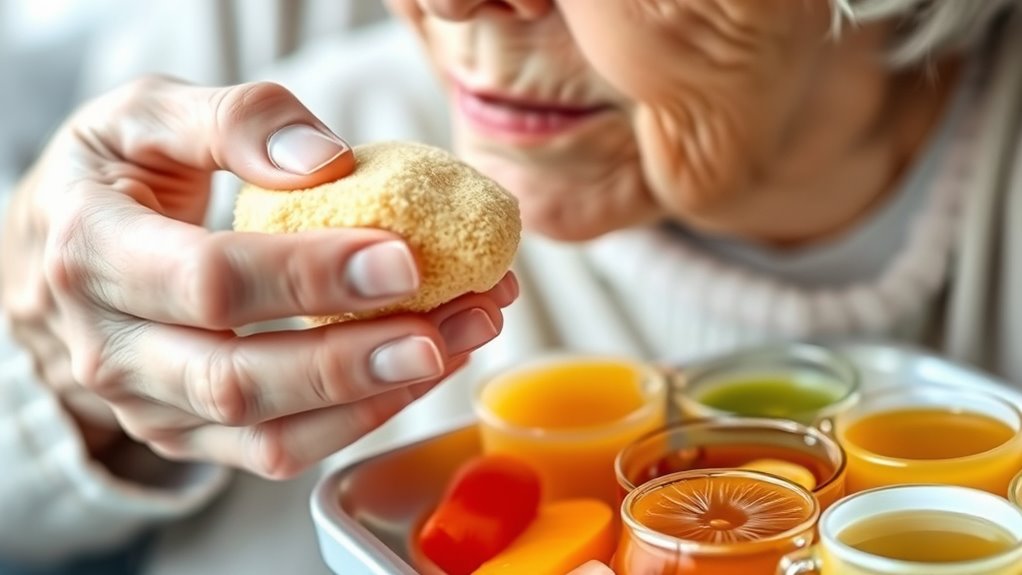At the end of life, maintaining oral care, hydration, and proper nutrition helps keep your loved one comfortable and preserves their dignity. Gently brushing teeth, keeping the mouth moist, and offering small, soft foods can reduce discomfort and prevent infections. Encourage sips of fluids, adjusting as needed for comfort and swallowing ability. Focusing on these gentle steps supports their well-being. To learn practical tips for providing compassionate care, keep exploring the essentials of comfort-focused end-of-life support.
Key Takeaways
- Maintain oral hygiene with gentle brushing, moistening the mouth, and ensuring dentures are clean to prevent infections and discomfort.
- Offer small, frequent bites of soft, easily digestible foods to support nutrition without causing pain or fatigue.
- Encourage regular sips of fluids, like water or broth, to keep the mouth moist and prevent dehydration.
- Focus on comfort and dignity by adapting care to fluctuating needs and recognizing cues of discomfort or preferences.
- Use saliva substitutes and create a soothing environment to enhance overall comfort and quality of life at end of life.

As life approaches its final stages, maintaining proper oral care and nutrition becomes increasingly essential. During this time, your focus should be on making your loved one comfortable and ensuring their dignity is preserved. Good dental hygiene plays a vital role in this process. Even when appetite loss occurs, it’s important to keep the mouth clean to prevent infections, sores, or discomfort. Gently brushing teeth and gums with a soft-bristled brush helps remove plaque and bacteria, reducing bad breath and preventing oral infections. If the person has dentures, make sure they’re properly fitted and cleaned regularly. Keeping the mouth moist is equally important, especially if dryness becomes a problem. Using saliva substitutes or water frequently can help ease discomfort and make swallowing easier.
Appetite loss is common at this stage, and it’s crucial to adapt nutrition strategies accordingly. Don’t insist on large meals; instead, offer small, frequent bites of easily digestible foods. Soft foods like soups, smoothies, or mashed fruits and vegetables can provide necessary nutrients without causing discomfort. Hydration remains a key concern, as dehydration can worsen symptoms and reduce overall comfort. Encourage sipping fluids regularly, offering water, electrolyte drinks, or broth to keep the mouth moist and support hydration. If swallowing becomes difficult, consult healthcare providers about alternative methods like thickened liquids or nutritional supplements to ensure your loved one receives enough fluids and calories. Incorporating integrated health tools can further aid in monitoring hydration and nutritional status remotely.
Recognize that the goal at this stage isn’t to maximize intake but to maintain comfort and dignity. Pay attention to cues that indicate what your loved one enjoys and what causes discomfort. Sometimes, even the most nutritious foods may not be tolerated, and that’s okay. Focus on creating a soothing environment, maintaining oral hygiene, and providing small amounts of nourishment to keep them comfortable. Keep the mouth clean and moist to prevent infections and reduce pain. Be gentle and patient, understanding that their needs may fluctuate day by day. Remember, your presence, compassion, and attention to oral hygiene and hydration can greatly enhance their quality of life during this sensitive time.
Frequently Asked Questions
How Can I Tell if My Loved One Is in Pain From Oral Issues?
You can tell if your loved one is in pain from oral issues by observing pain indicators like facial grimacing, clenched fists, or withdrawal. They may also show signs of oral discomfort such as refusing to eat or drink, increased agitation, or crying. Pay attention to their breathing patterns or if they keep their mouth closed or appear restless. These cues help you recognize when they’re suffering from oral pain.
Are There Specific Foods to Avoid During End-Of-Life Nutrition Care?
Think of your loved one’s diet as a delicate dance—certain foods to avoid can trip them up. Steer clear of spicy, acidic, or hard textures that may cause discomfort or choking. Respect dietary restrictions like low-sodium or sugar limits, and avoid foods that might irritate oral tissues. By choosing gentle, nourishing options, you help ease their journey, turning eating into comfort rather than challenge.
How Do I Manage Dry Mouth Effectively in Palliative Care?
To manage dry mouth effectively, you should encourage the use of saliva substitutes and oral moisturizers regularly. Sipping water often helps, but avoid alcohol-based mouthwashes that can dry out your mouth further. Keep lips moist with lip balm and maintain good oral hygiene. If dryness persists, consult with healthcare providers for additional options like medicated rinses or specialized products to keep your mouth comfortable.
What Are the Signs of Dehydration in Terminal Patients?
You’ll notice signs of dehydration in terminal patients through dry, cracked lips and mouth, decreased skin turgor, dark urine, and confusion. They may also experience oral health discomfort, such as sore or dry mouth, and decreased saliva production. Watching for these symptoms helps you identify dehydration early, so you can prioritize comfort measures like gentle oral care and hydration support to ease their distress.
Can Oral Infections Accelerate Decline at End of Life?
Like a shadow creeping in, oral infections can accelerate decline at end of life. They pose significant oral infection risks and can impact comfort, making patients more restless or distressed. These infections may worsen pain or difficulty swallowing, leading to decreased intake and further decline. Addressing them promptly helps preserve dignity and comfort, ensuring that the final days remain as peaceful and pain-free as possible.
Conclusion
Think of yourself as a gentle gardener tending a fading flower. Your careful oral care, hydration, and nutrition nurture comfort and dignity in those final days. Just as water and sunlight help a flower rest peacefully, your thoughtful actions support a peaceful, graceful end. By tending to these needs with compassion, you help preserve their dignity and ease their journey home. Your kindness becomes the quiet, guiding light in their final moments.









